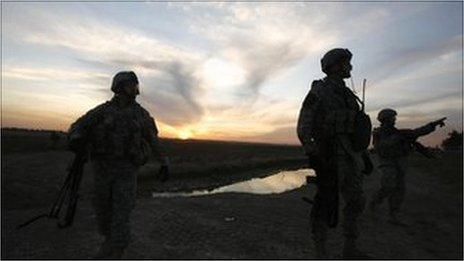Iraq Inquiry: Inject urgency to complete report, peers urge
- Published
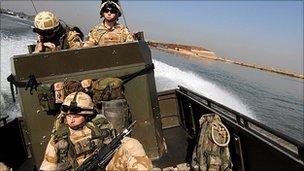
179 British military personnel were killed in Iraq between 2003 and 2009
Peers have called for a speedy conclusion to the Iraq Inquiry amid growing dissatisfaction with the length of time it is taking to report.
Former Conservative Foreign Secretary Lord Hurd called on ministers to "inject some urgency" into proceedings.
Labour peer Lord Morris called for a "time limit" on inquiries while Lib Dem Baroness Williams said lessons would be less relevant with the passage of time.
Government Minister Lord Hill said the inquiry determined its own timetable.
Iraq recently marked the 10th anniversary of the US-led invasion which toppled Saddam Hussein.
The inquiry into the UK's involvement in the invasion and its aftermath, led by former civil servant Sir John Chilcot, began its work in 2009 and held its last public hearings in 2011.
'Free hand'
Although Sir John has never set a deadline for completing the inquiry's work, it was initially hoped that it would be in a position to hand its report to the prime minister at the end of 2011 or by some point in 2012 at the latest.
However, the process has dragged on and in his latest update - in July 2012 - Sir John said he hoped to begin the process of contacting individuals criticised in the document to give them the opportunity to respond - an official process known as Maxwellisation - by this summer.
This means that the report could potentially be delayed until 2014.
Responding to a question on the issue in the House of Lords, Lord Hill said the government had no plans to discuss the inquiry's timetable with Sir John.
"It is very important that this inquiry is independent and it was set up very deliberately to be independent," he told peers. "It must consider the evidence it has got and reach its conclusions which we will all be able see in the fullness of time. It must have a free hand to do that."
But Lord Hurd urged his colleague to "inject a little bit of urgency into this process". He told peers: "The furthest we got today from him was to say we would have the benefit of the report in the fullness of time. In our experience, the fullness of time is fairly full."
Baroness Williams warned that the usefulness of the lessons depended on the "passage of time" and there was a "gap between the necessary and right attempts to give people the right to respond but also the importance of the conclusions on the future work of this government".
In response, Lord Hill acknowledged that for any lessons to be applicable in future, they must be presented within a "reasonable timeframe" but insisted the inquiry should not be "rushed".
'Almost infinite'
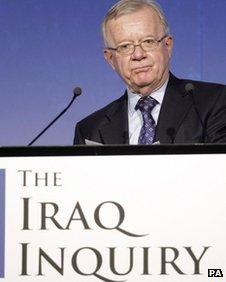
Sir John has said the scope of the report is "unprecedented"
Former Labour attorney general Lord Morris said he had "noticed a tendency for public inquiries to be longer, longer and longer".
He added: "I realise the need to collect all the material evidence and for all due processes to take place but should there not be, in future, a time limit imposed and only, in exceptional circumstances should an extension be granted."
In the past, Sir John has appeared to be express frustration at the length of time that it has taken for some government documents to be declassified so they could be referred to in the final report.
Cross-bench peer Lord Butler, who conducted his own inquiry in 2004 into the intelligence used to justify the decision to go to war, said Chilcot's terms of reference were "so wide as to be almost infinite".
"The timing of the publication of the report depends not just on the handling of the representations but the government's own clearance of what is to be included in the report. Will he undertake that this process will be done as quickly as the government can manage?"
'Working well'
Lord Hill said the Chilcot inquiry had made it clear that the process of de-classification was "working well" and the government would co-operate as fully as it could to "expedite the process of de-classification".
A spokesman for the Iraq Inquiry said it had nothing to add to Sir John's last update about the process. In July, Sir John said "extensive progress" had been made but the task was "complex and difficult" given the unprecedented scope of the period under review.
The final report, he added, would be about a million words long, about twice the size of literary epic War and Peace.
One hundred and seventy-nine British troops were killed in Iraq between 2003 and 2009.
According to the US Department of Defense, 4,487 US military personnel were killed in Iraq between March 2003 and July 2010. The organisation Iraq Body Count says between 97,461 and 106,348 Iraqi citizens were killed over the same period.
- Published16 July 2012
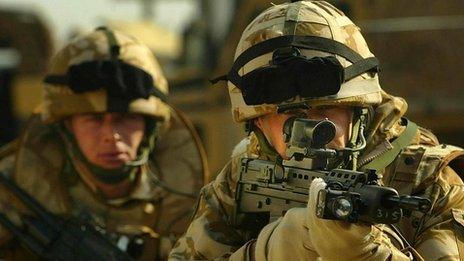
- Published5 July 2016
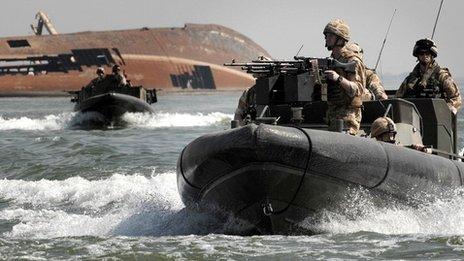
- Published14 December 2011
